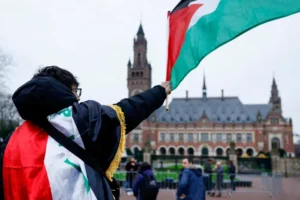Israel, ICJ and the movement for a principled and just world order

A man waves a Palestinian flag on a day of the International Court of Justice (ICJ) public hearing on the legal consequences of Israel’s occupation of Palestinian territories, 21 February 2024
Erin McCandless writes in Al Jazeera on 28 February 2024:
South Africa’s genocide case against Israel at the International Court of Justice (ICJ) is shaking the foundations of the rules-based international order. The increasing number of state and non-state actors voicing their support for this case, and Palestinian liberation in general, is signalling the emergence of a movement for a more principled, fair and just international order.
Indeed, states, regional bodies, international institutions and civil society organisations across the world are taking a stand against Israel’s war on Gaza, and its Western allies’ seemingly unconditional support for it. Demands are focussed on an immediate ceasefire in Gaza and a permanent and just resolution to the Israeli-Palestinian conflict – a solution that considers the context of Israel’s decades-long occupation of Palestinian territory and the Palestinian people’s right to self-determination.
In the process, the moral, institutional and legal foundations for a more just and principled rules-based order are being built – one where acts of aggression are not overlooked, and international humanitarian law applies equally to everyone.
The fragility of the current rules-based order was apparent long before the attack on Gaza.
With powerful permanent members routinely vetoing United Nations Security Council (UNSC) resolutions according to their national interests and preferences, the international community has been struggling to take collective action to uphold humanitarian law, protect vulnerable communities and punish rogue actors.
In a system built on asymmetrical and unjust colonial foundations, where financial, political and legal institutions have inherent shortcomings, selective adherence to international law has long caused dispute among nations. The UN itself cited the double standards in the application of certain rights as a threat to global security in its New Agenda for Peace, in July 2023 – months before the beginning of the latest attack on Gaza.
Israel’s war on Gaza, and the world’s response to it, however, have highlighted these existing shortcomings and sped up the system breakdown that was already under way.
The global community’s radically different response to Russia’s international humanitarian law violations in Ukraine and those of Israel in Gaza made it apparent that under the current rules-based order, all human life is not valued equally.
